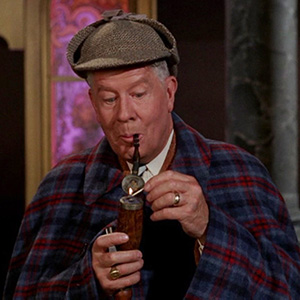Rudy Vallee, 85, Crooner and Star for 60 Years, Dies
Rudy Vallee, the megaphone-carrying crooner who became a star nearly 60 years ago with his tribute to fellow Yalies drinking down at Mory's with their glasses raised on high, died Thursday evening at his Hollywood Hills home. He was 85.
Vallee died while watching the Statue of Liberty centennial ceremonies, said his wife, Eleanor.
"Rudy was watching the unveiling of the Statue of Liberty and he remarked: 'I wish we could be there; you know how I love a party.' Then he took a big breath, and he died," she said.
Vallee had been in failing health for several months. He was hospitalized at Cedars-Sinai Medical Center in February after a fall at his home. Doctors found a growth on his esophagus and operated, but the singer later developed pneumonia and suffered a stroke, according to his agent, Chris Harris.
But almost to the end, Vallee had proved durable, continuing to work well into his 70s. He had started as a saxophonist and band leader in the 1920s and, for the next two decades, was one of the nation's most successful vaudeville and radio personalities.
And, never known for his reticence, he wrote not one but three autobiographies and in the 1970s fought a loud and nasty battle with city officials to get the name of the street in the Hollywood Hills on which he lived changed to Rue de Vallee.
"I'll be front page news until the day I die," said Vallee in a 1962 interview in which he denied that his starring role in Broadway's "How to Succeed in Business Without Really Trying" was a comeback. Vallee insisted he had never been gone.
In a sense, he was right. Through his career ups and downs, the man had a certain undeniable panache.
In his later life, he served as a reminder of the old Hollywood--the days of long sleek roadsters, tweeds and snap-brim hats, radio shows and plush nightclubs and glamorous people looking like glossy photographs.
His body had thickened a bit, but his eyes were alive and when he smiled, which was often, it was the familiar Vallee smile, consuming his face under a swatch of thinning but still very red hair.
Vallee was a spirited, hospitable, garrulous man--an American original.
He was born Hubert Prior Vallee in Island Pond, Vt., on July 28, 1901, of French-Irish parents. He took the first name Rudy in the 1920s from Rudy Wiedoeft, a saxophonist he liked.
Young Rudy's first musical instrument--at the age of 4--was a drum, which he frequently banged on to alleviate the pain of the earaches that plagued him as a child. As he grew up, Rudy began to master the drums, piano and clarinet.
Vallee's start in show business was on the ground floor. In 1917, he took a job as usher, janitor and operator of the hand-cranked projection machine at a movie theater in Westbrook, Me. A year later, he moved on to a job as head usher in a theater in Portland, where he taught himself to play the saxophone. By 1920, he was making a few dollars performing as a saxophonist in a local orchestra.
Vallee attended the University of Maine and, later, Yale. To pay his tuition and board, he began to play with dance bands in New York and Boston. He also occasionally sang with the bands, using a truncated megaphone.
The megaphone, of course, became his trademark, although at the time its use was not uncommon among singers. He and the megaphone became familiar sights in the 1920s and 1930s. With the megaphone in hand, and sometimes wearing a college sweater, he sang in a rich, somewhat nasal voice, that Yale drinking ditty, the "Whiffenpoof Song," as well as "My Time is Your Time" and "I'm Just a Vagabond Lover."
Vallee graduated from Yale in 1927 and, a year later, formed an eight-piece band at the new, exclusive Heigh-Ho Club in New York City. A local radio station began to broadcast live from the club, and Vallee was on his way to stardom.
By 1929, Standard Brands had signed Vallee and his band for an hourlong weekly radio show to advertise Fleischmann's Yeast. It became known as the "Fleischmann Hour" and in 1932 evolved into radio's first variety show. Vallee was more than a singer and band leader; he also was a master of ceremonies, introducing other talent.
Vallee branched out in the 1930s, forming a talent agency and two music publishing companies. He began grinding out a long list of hit songs that included the University of Maine "Stein Song," "Good Night Sweetheart," "I Kiss Your Hand, Madame," "Lover Come Back to Me," "Springtime in the Rockies," "Honey" and "Marie."





No comments:
Post a Comment